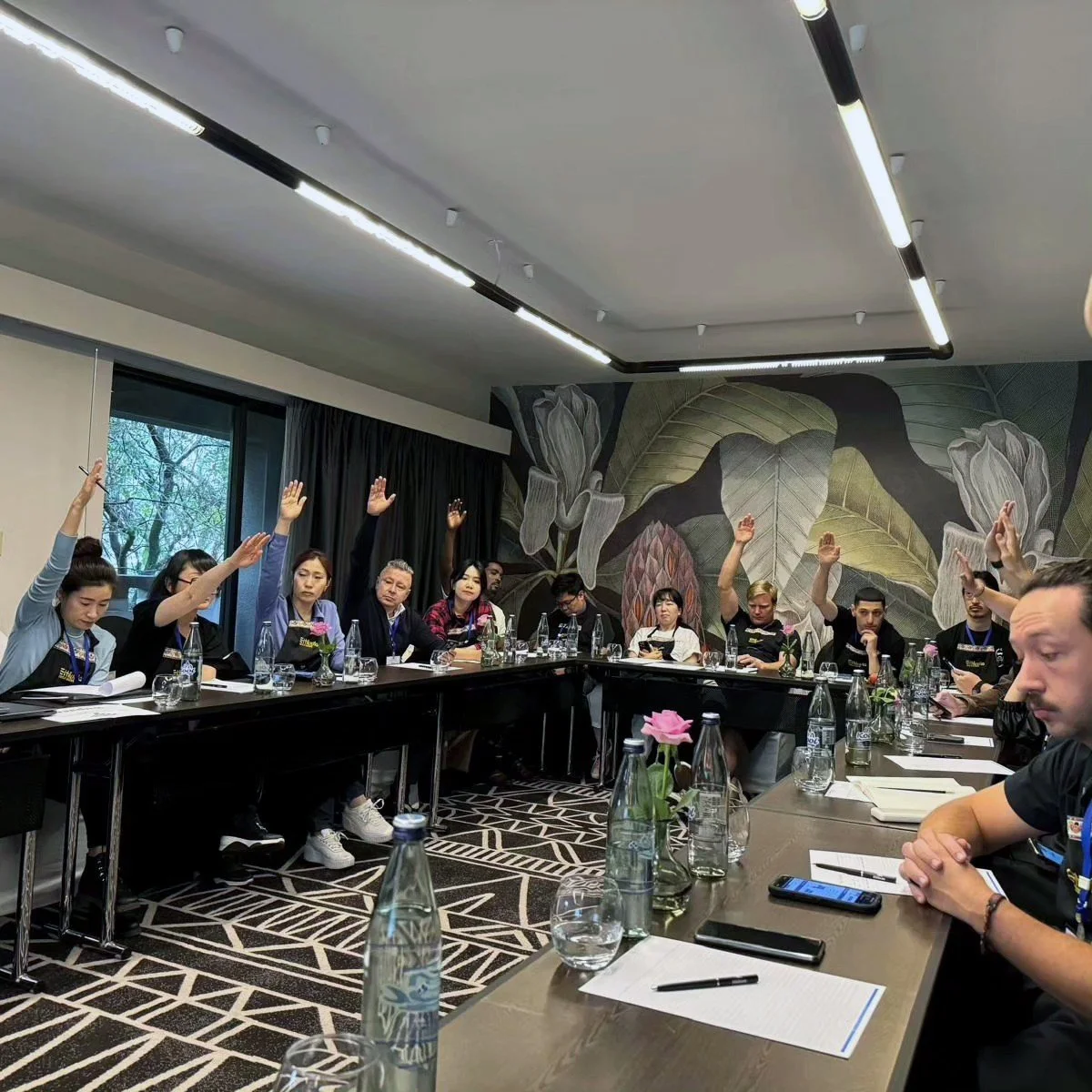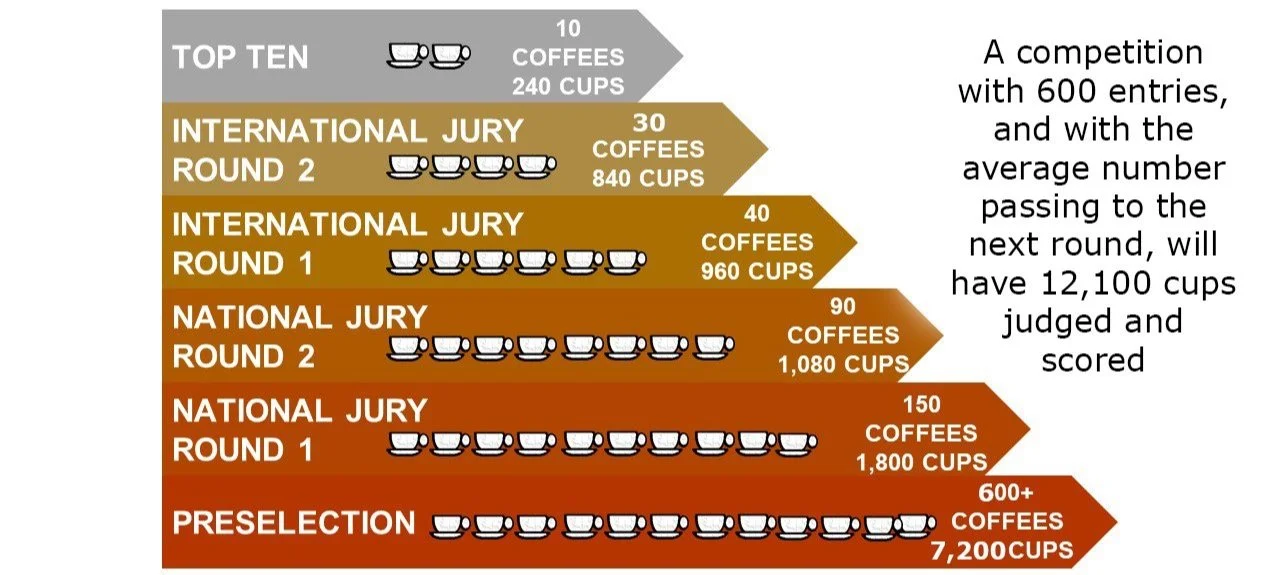Ethiopia, CoE 2024
The land of coffee. The birthplace of coffee. Where coffee was born. Ethiopia has many monikers, most of which center around coffee. The genus Coffea is indigenous to the southwestern highlands of Ethiopia and the surrounding Boma Plateau in southeastern Sudan and Mount Marsabit in northern Kenya, and it is from this small region that all species and cultivars found throughout the world descend. Coffee is part and parcel of Ethiopia, it is in the land, in the blood of the people, in the air, and of course, in the cup. As a result, Ethiopian coffee holds a special place among coffee lovers and professionals, and when the Alliance for Coffee Excellence (ACE) announced that the prestigious Cup of Excellence (CoE) program was launching in Ethiopia in 2020, the news took the coffee world by storm.
Then COVID hit, and the world shut down. Through a series of strategic and mind-blowing maneuvers, ACE/CoE somehow kept going. With its deep commitment to farmers, ACE/CoE and the coffee world came together to hold “remote” cuppings in order to judge the submissions and to still be able to hold the competition. The result in that very first year was that 28 coffees went to auction and over 1.3 million dollars was raised to directly assist coffee farmers in Ethiopia. However, something was missing – the competition did not take place in Ethiopia, but in professional coffee labs around the world. So when it was announced in February of 2024 that the competition would take place in Ethiopia for the very first time, another media frenzy took place and Q graders and judges all over the world frantically put in applications to be part of the first ever Ethiopia International Jury.
When you fly into Ethiopia’s capital city of Addis Ababa, you generally come from the north, flying over small family farms located in the foothills of the Entoto Mountains, which overlook the city. All the coffee, however, is grown another 2 hours south by plane (or 7 hours by car) in the southern Ethiopian highlands. Addis Ababa is a bustling city of 5+ million people, and it is here where all the coffee trading, international brokers, government offices, and almost all of the coffee milling facilities are located. It would also be the host city for the 2024 Cup of Excellence National and International Jury phases.
Monday morning started at 8am sharp, with me and 21 other International Jurors (along with 4 International Observers) arriving in the “discussion room” next to the cupping room to go over the week’s agenda. I was deeply honored to have been one of a very special set of 22 International Jurors, but also nervous as I was in a room of cupping royalty from around the world – Japan, South Korea, China, Germany, Oman, Czech Republic, Bulgaria, Lithuania, The Netherlands and more. This was going to be my 8th time judging a Cup of Excellence competition, but the nerves are always high on day one. Monday was to be our easiest day as we would only cup 40 coffees as we calibrated. The following three days is where the work would take place, cupping through 160 cups per day to arrive at the top 30 coffees that would then go to auction.
For the 2024 competition, over 600 samples had been received from across Ethiopia. After a selection of National Jurors comprised of the best cuppers in Ethiopia is completed, a preselection phase takes place where the National Jurors whittle down all 600 samples to the 150 highest scoring lots. Then the national phase takes place where the National Jurors again evaluate the top 150 coffees and only keep the top 40 coffees with scores of 87 points and above. These two rounds were all completed in the weeks prior to my arrival, and now everyone was gathered for the International Phase, where we would cup through the top 40 coffees to arrive at their rankings and scores.
The International Phase of the Cup of Excellence competition is always an intense time, with long days spent cupping and discussing the coffees. For Ethiopia, the days were spent cupping through 4 separate rounds or tables, each with 40 cups per round or table. If one does the math, they soon realize that Cup of Excellence winning coffees are some of – if not the most – vetted coffees in the world. Each coffee is placed 4 times per round, with generally 7-8 tables per round to accommodate all the judges. That means that during the International Phase, a winning coffee will be cupped at least 256 times, and if the coffee makes it into the Top 10, then it will have been cupped 384 times! This does not even include the Preselection and National Phases. I do not know of any competition, green trader, or roaster that cups the same coffee 10 times, let alone 384 times.
Over the course of the days, it was obvious that these were amazing coffees – explosions of berries and stonefruits, floral aromatics, complex body and acidity – it seemed that each coffee was a winner. However, as the cupping went on and the scores were tallied each night, certain coffees kept rising to the top until we reached the final day, when as a reward we only had to cup the Top 10.
Cupping the Top 10 coffees was a pure delight, a “reward” in a way for the long grueling days prior. The pace is more relaxed, there are more smiles around the room, and it becomes clear that the entire process that Cup of Excellence has established over the past 25 years works. These were the best of the best coffees grown, harvested, processed, and submitted to the competition in Ethiopia for the 2023/2024 season.
In the end, all of the winning coffees for the 2024 Ethiopia Cup of Excellence competition were natural processed coffees. No washed or anaerobic processed coffees scored above 87 points, although plenty were submitted. The full competition results can be found here.
After the intense week cupping coffees, I spent a few more days visiting some of the top producers in Ethiopia, including Tamiru Tadesse who won first and fifth place in the 2021 competition, Leikun Zegeye Dagnachew who won first in 2020, 25th in 2021, and 20th in 2024, and Mebrahtu Aynalem who won 21st in 2020 and 13th in 2021. Building and solidifying long-term relationships with producers is one of the key pillars of Idle Hands Roasting Company and the primary way we source coffee.
By Peter Jones.
Also had the chance to be hanging with longtime partner and producer Mebrahtu Aynalem, who is one of the founders of Boledu Coffee where we source our Halo Beriti from!






